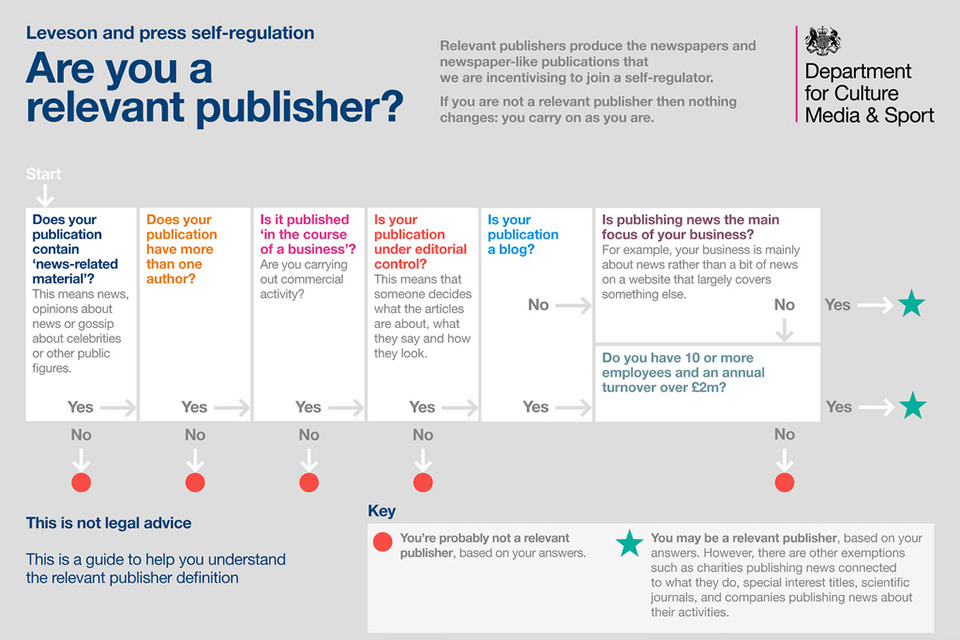Independent self-regulation of the press: who does it apply to?
Published 23 April 2013
A new system of voluntary self-regulation of the press, supported by an independent recognition process, is being introduced following the publication of Lord Justice Leveson’s report.
The publishers that we - and Lord Justice Leveson - want to encourage to join a self-regulator are those who publish news-related material (broadly news, current affairs and gossip). These are described in the legislation as ‘relevant publishers’ who will be covered by a series of incentives to encourage them to sign-up to a recognised press self-regulator.
To qualify as a relevant publisher, four tests must be met. They are:
- publishing ‘news-related’ material;
- in the course of a business;
- which is written by different authors and;
- is subject to editorial control.
But various types of publisher are exempt even if they meet the four tests. They are:
- Broadcasters
- Special interest titles
- Scientific or academic journals
- Public bodies or charities publishing news in connection with their functions
- Company news publications
- Book publishers
- Micro businesses that are a multi-author blog or publishing news incidentally to their main business
1. The four tests
1.1 ‘News-related’ material
This means publishing news, current affairs, discussion and opinions about news or current affairs, or gossip about celebrities or people in the news.
1.2 In the course of a business
This means the publisher must be engaged in some level of commercial activity. Making a profit is not part of the test and simply being a company does not automatically make someone a “relevant publisher”. The question is whether they are running a business and carrying out commercial activity.
1.3 Written by different authors
Is the news related material written by more than one author? If so, it will meet this part of the test. But, if the material is written by a single person then the publisher is not a ‘relevant publisher’. So, for example, a single-author blog is not a “relevant publisher”.
1.4 Subject to editorial control
This means that someone is making decisions about the material before it is published. They will be deciding what the material is about, what it says, how it looks and whether to publish it. Editorial control does not include moderating comments posted on a news story, forum or message board. If you run a forum and moderate comments posted on it then you are not regarded as having editorial control.

Leveson flowchart
View a larger version of our flowchart explaining the relevant publisher definition on flickr.
2. Exemptions
These categories of publisher are exempt from being a relevant publisher.
2.1 Micro- businesses that are blogs (subject to amendments due to be debated Tuesday 23 April)
A multi-author blog that is also a micro-business is exempt.
A micro-business is one with fewer than 10 employees and an annual turnover of £2m or less. The number of employees is calculated by adding up the hours that all employees work and dividing it by 37.5. This ensures that companies are not discouraged from hiring staff part-time. Freelancers do not count towards this calculation. The normal definition of “employee” has been used in the legislation.
The Companies Act definition of a small business - below 50 employees and a turnover less than £6.5m - was considered too high for the level of small-scale news publishing intended to be exempt.
Any publisher exempt under this section that chooses to join a self-regulator would get the same incentives that relevant publishers receive when signing-up to a self-regulator. These benefits consist of protections from exemplary damages and favourable presumptions on awarding costs in civil legal cases.
2.2 Micro- businesses where the publication of news-related material is incidental to its business (subject to amendments due to be debated Tuesday 23 April)
A micro-business publishing news would also be exempt if news publication was incidental to the main activity of the business. This means that publishing news is secondary to the main activity of the business. For example a website that sells records and features a bit of news would not be a relevant publisher. Its main business activity would be selling records and the news publication was incidental to that business. Any publisher exempt under this exemption that chooses to join a self-regulator would get the same incentives that relevant publishers receive when signing-up to a regulator. These benefits consist of protections from exemplary damages and favourable presumptions on awarding costs in civil legal cases.
2.3 Broadcasters
This category covers the BBC, S4C, and any other organisation with a licence under the Broadcasting Act 1990 or 1996 where the news-related material is in connection with the broadcasting activities authorised under the licence. So broadcasters like Sky, ITV, and Channel 4 are also exempt.
2.4 Special interest titles
Niche titles that focus on specialist areas are exempt from being classed as a relevant publisher. So if a publication focuses on a pastime, hobby, trade, business, industry or profession then it is not a relevant publisher, provided that the news in the publication is incidental to its main specialist content.
2.5 Scientific or academic journals
Scientific or academic publications will largely contain scholarly articles but they will occasionally contain news as well. Where the news is incidental to the scientific or academic content, the publication will be exempt.
2.6 Public bodies, charities and company news
A publication produced by a public body (such as a council or police force), charity or company about their activities will be exempt. So a newsletter about what a charity has done in the last few months would not qualify. Local authority publications, including newspapers, would be exempt from being a relevant publisher. However Local Government Secretary Eric Pickles has announced his intention to legislate council publicity rules in order to preserve a strong, vibrant and independent local press.
2.7 Books
Book publishers are exempt unless the publication is published every so often with substantially different content.
